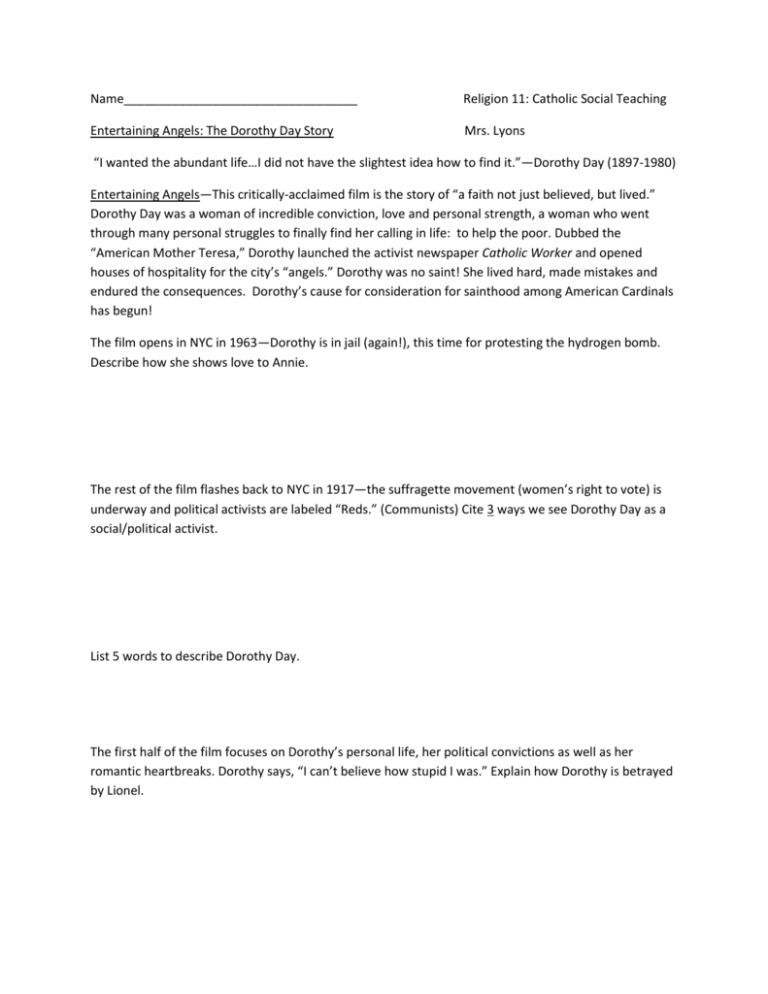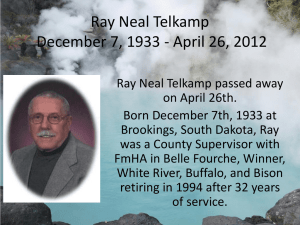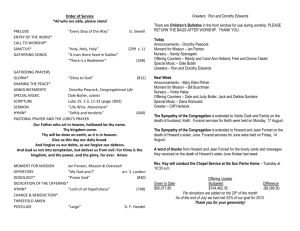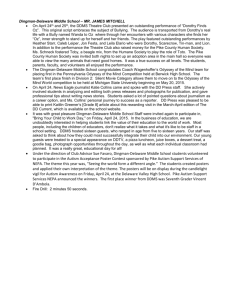Name__________________________________ Religion 11
advertisement

Name__________________________________ Religion 11: Catholic Social Teaching Entertaining Angels: The Dorothy Day Story Mrs. Lyons “I wanted the abundant life…I did not have the slightest idea how to find it.”—Dorothy Day (1897-1980) Entertaining Angels—This critically-acclaimed film is the story of “a faith not just believed, but lived.” Dorothy Day was a woman of incredible conviction, love and personal strength, a woman who went through many personal struggles to finally find her calling in life: to help the poor. Dubbed the “American Mother Teresa,” Dorothy launched the activist newspaper Catholic Worker and opened houses of hospitality for the city’s “angels.” Dorothy was no saint! She lived hard, made mistakes and endured the consequences. Dorothy’s cause for consideration for sainthood among American Cardinals has begun! The film opens in NYC in 1963—Dorothy is in jail (again!), this time for protesting the hydrogen bomb. Describe how she shows love to Annie. The rest of the film flashes back to NYC in 1917—the suffragette movement (women’s right to vote) is underway and political activists are labeled “Reds.” (Communists) Cite 3 ways we see Dorothy Day as a social/political activist. List 5 words to describe Dorothy Day. The first half of the film focuses on Dorothy’s personal life, her political convictions as well as her romantic heartbreaks. Dorothy says, “I can’t believe how stupid I was.” Explain how Dorothy is betrayed by Lionel. Dorothy retreats to her cottage on Staten Island for solitude, reflection and healing. There she meets up again with Forrester. How is Forrester good for Dorothy? How is Forrester wrong for her? On a wild bike race all over town, Dorothy almost runs over a nun! Here she befriends her and the homeless of Staten Island, specifically Lou who lives on the beach. Dorothy says, “Look, I heard what Jesus said, and I say, ‘Great’…but where is Jesus in your church?” Sister responds, “Right smack in the middle…in the working class, in the immigrants, in the poor…God with a human face, grabbing ahold of us, ready to fill our emptiness.” Describe how Dorothy’s activism begins here on Staten Island. Praying in church, Dorothy says, “You really sneak up on a person.” Lou, not Forrester, is present at Tamar’s (and her) baptism. Why is this significant? What does this say about Dorothy? Back in NYC, Dorothy meets Peter Maurin, her mentor, a selfless man with a vision for humanity. He showed Dorothy how she could use her journalistic talents and energy to feed the homeless during the Depression. He taught Dorothy how to apply, in a real, practical sense, all the things she felt in her heart. Why did he choose to live with the poor? Peter says, “You don’t have to go to Jerusalem or Rome to find God.” What does he mean? Dorothy’s sister-in-law says, “My mother used to say, ‘Be careful. You never know when you may be entertaining an angel.’” What does this mean? The rest of the film focuses on service to the poor. Dorothy, who wrote for The Call, starts her own newspaper, Catholic Worker, because “the poor need a voice.” Yet Dorothy prays, “I write, but that’s not enough. I gotta do, but what? Please show me how.” Dorothy says, “How am I able to tell others to love the poor, if I am not able to do it myself?” Give examples from the film as to how she lives this out. Dorothy is recognized for her work, receiving an award for her humanitarian efforts, and in the very next scene she is scrubbing a toilet. What is the message here? Dorothy’s Catholic Worker House is visited by the Cardinal on NYC who says people call her a Communist infiltrator who has come to destroy the church, to which Dorothy responds, “I thought we were being church.” He continues criticizing her devotion to the poor, her insistence on being poor herself. Dorothy says, “If you feed the poor, you are a saint. If you ask why they are poor, you are a Communist.” Explain. The Cardinal says, “You’ve set a difficult path for yourself, telling us things we don’t want to hear, loving people who are hardly lovable, giving and getting nothing back.” Explain how this is truly the essence of CST. How is Entertaining Angels critical of the church? In the scene where she yells at a statue of Jesus, a distraught Dorothy describes the poor: “They smell. They vomit…am I to find you in them? How can anyone ever love you?” What’s the message here? Could you live the life Dorothy lived? Why or why not? Dorothy says to Dan, “I don’t think God will judge us on how successful we are at changing the world. I do think He will judge us on how faithful we are serving His poor.” What have you learn about faith? About service to others? Of the need for others in one’s journey of faith? The title comes from Hebrews 13:2--“Do not neglect hospitality, for through it some have unknowingly entertained angels.” (The ancient Greeks valued hospitality toward strangers as they believed they could be gods in disguise!) Why is this a good title for the film?





